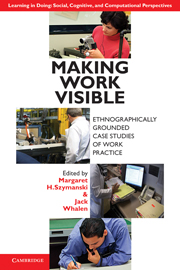Book contents
- Frontmatter
- Contents
- List of Figures and Excerpts
- List of Tables
- List of Contributors
- Series Foreword
- Foreword by John Seely Brown
- Acknowledgments
- Introduction
- Part I Work Practice Study in Historical Context
- Part II Applying Work Practice Methods
- Part III Practices around Documents
- Part IV The Customer Front
- Part V Learning and Knowledge Sharing
- Part VI Competency Transfer
- 18 Fujitsu Learned Ethnography from PARC
- 19 The Work Practice Center of Excellence
- 20 Transferring Ethnographic Competence
- References
- Index
- LEARNING IN DOING: SOCIAL, COGNITIVE AND COMPUTATIONAL PERSPECTIVES
18 - Fujitsu Learned Ethnography from PARC
Establishing the Social Science Center
Published online by Cambridge University Press: 05 August 2012
- Frontmatter
- Contents
- List of Figures and Excerpts
- List of Tables
- List of Contributors
- Series Foreword
- Foreword by John Seely Brown
- Acknowledgments
- Introduction
- Part I Work Practice Study in Historical Context
- Part II Applying Work Practice Methods
- Part III Practices around Documents
- Part IV The Customer Front
- Part V Learning and Knowledge Sharing
- Part VI Competency Transfer
- 18 Fujitsu Learned Ethnography from PARC
- 19 The Work Practice Center of Excellence
- 20 Transferring Ethnographic Competence
- References
- Index
- LEARNING IN DOING: SOCIAL, COGNITIVE AND COMPUTATIONAL PERSPECTIVES
Summary
Preface
This chapter differs from all others in this volume in that it describes a three-year PARC project with Fujitsu – named here as the “PARC Knowledge Management Project” – from the point of view of our partner organization. Authored by the Fujitsu leader on the project, Koji Kishimoto, it provides a detailed account of the difficult situation Fujitsu faced in their system development division, and why they sought the help of PARC ethnographers. Kishimoto also gives us a frank assessment of what Fujitsu hoped to get from PARC – essentially, a “silver bullet” in the form of ready-to-use techniques and tools that would produce immediate and dramatic improvement in their business. Moreover, as Kishimoto makes clear, Fujitsu system engineers were used to exhaustively plan out all their project work in advance, and so our ideas about exploration and discovery, where you first need to understand the true nature of the problem and then gradually begin to mark out a strategy to attack it, appeared rather strange.
But soon enough we both found ways to work together effectively, to learn from each other. And as the chapter makes plain, at the end of the day we were quite successful. One of the most important accomplishments of the project, the creation of a Social Science Center inside Fujitsu's system development organization – surely a first in the long history of software development – was achieved not by Fujitsu copying PARC's ways of doing applied ethnography but rather by adapting our principles to their own operation, to their own organization's culture.
- Type
- Chapter
- Information
- Making Work VisibleEthnographically Grounded Case Studies of Work Practice, pp. 327 - 335Publisher: Cambridge University PressPrint publication year: 2011
- 1
- Cited by



